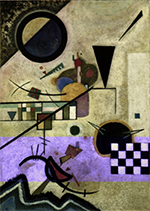
The Absurdity of Things Human
"in the close-woven stuff of relations between conspirator and police there occur unexpected
solutions of continuity, sudden holes in space and time” (63).
Joseph Conrad The Secret Agent (1907)
Joseph Conrad's The Secret Agent (1907), chps. 4-9
- are the characters able to deduce valid conclusions from the empirical evidence provided by the senses?
- is Chief Inspector Heat an insightful, more than competent law enforcement official?
- why does Heat prefer dealing with the crime of theft instead of anarchist acts of destruction?
- is the Professor’s ominous self-confidence a pose or an unshakeable fact?
- to what degree does the narrator himself shape the reader’s opinion of the Professor? Are the narrator’s character judgments intrusive—does it bother you to be told what to think about this character?
- how does the medical scene at the center of chapter five (64-67) retroactively inform the discussions of violence in chapters three and four? Does it make Karl Yundt’s and the Professor’s casual views on bloodshed seem appropriate, absurd, or reprehensible?
- what personal weaknesses do Chief Inspector Heat and the Assistant Commissioner each display in chapter seven? Are either of them unfit for duty as law enforcement officers?
- why does Heat prefer dealing with the crime of theft instead of anarchist acts of destruction?
- why does the Assistant Commissioner avoid giving Sir Ethelred, the Secretary of State, details about the recent bombing incident?
- is the Assistant Commissioner convinced that the bomb outrage was the result of anarchist machinations (100-103)?
- how useful an employee is Chief Inspector Heat, as described by the Assistant Commissioner to Sir Ethelred (102-104)?
- in the latter part of chapter seven, we see the Assistant Commissioner cheerfully adopting the guise and manner of an undercover agent as he darts about London (108-10). Does the chapter end with the same lighthearted tone established by his play acting?
- why does Winnie's mother not leave Stevie any furniture in her will?
- why does Winnie's mother think Stevie only "a little peculiar" (114)? Does she understand the full range of his abilities more fully than others? What of Winnie--does she know her brother well?
- what authority figure does Winnie regularly reference to get Stevie to behave?
- does Conrad's characterization of Stevie mark him as a dependent idiot, a semi-dependent imbecile, or a virtually autonomous but simple-minded individual?
- does Stevie's linguistic ability seem appropriate in light of his other disabilities?
- why does Winnie's mother decide to move out on her own, and live in the more modest housing (one in a row of charity cottages) provided her by her husband's former coworkers?
- in what ways does Stevie's response to the cabman's woes (122-26) echo his past response to the complaints of office boys at his former work place (7)?
- why does the cabman choose to walk his horse away from Stevie?
- what does the narrator mean when he claims that Stevie is "not mad" but "reasonable" (123)? Do we take seriously the narrator's suggestion that Stevie feels things "with greater completeness and some profundity" compared with others (126)?
- compare and contrast Stevie and Winnie's very different assumptions about the proper responsibilities of policemen (126-28). What does Winnie's perspective suggest about her current worldview?
- we are told six different times in chapter eight that Winnie avoids looking too closely beneath life's surface (113, 114, 124, 127, 130, 132). Why is this? Is Mr Verloc himself willing to look beneath the surface of things (132)?
- what does the narrator mean when he explains that "Mr Verloc loved his wife as a wife should be loved--that is maritally" (132)?
- does Stevie's disability make him ridiculous?
- whenever he hears of others' pain, Stevie grows angry and wants to punish those responsible--sometimes physically. Why does his frustration manifest itself in rage, and why does this rage lead to belligerence? Is this a product of his upbringing, his intellectual disability, or something else?
- why might Stevie be growing more consistently anxious and brooding once his walks with Mr Verloc have become a regular habit?
- does the narrator suggest in chapter nine that Stevie understands pretty well what Verloc desires of him?
- are Verloc's teeth rattling upon his return home because he's been out in the cold (140)?
- what is the "way" Winnie knows of smoothing things over with Verloc (144)?
- in chapter nine, the reader adopts Winnie's own perspective as she listens to Chief Inspector Heat's questions and as she, soon thereafter, overhears Heat's conversation with Mr Verloc. How does the reader's new vantage point shape the impact of these two men's words? Does it change our emotional reaction to what they are saying?
- consider the symbolic significance of the vivid image rendered in the last sentence of chapter nine.
- let us make bold and assume that Conrad applied his ideas to his work. In the preface to the novel The Nigger of the 'Narcissus', Conrad suggests that art is an attempt to discover in life that which is "fundamental," "enduring," and "essential." Presumably, the "truth of life" can be captured and conveyed in the art of literature. What social and/or psychological truths does Conrad appear determined to illuminate in The Secret Agent thus far?

Contrasting Sounds (1924)
Wassily Kandinsky
Dr. Paul Marchbanks
pmarchba@calpoly.edu
![]()
